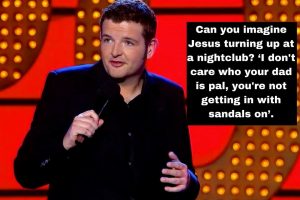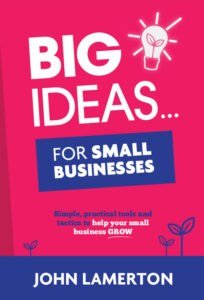Comedian Autobiographies: 6 things I learned from a stand-up comedian.
Comedian Autobiographies: 6 things I learned from a stand-up comedian.
I just can’t switch off.
Every now and then, I like to have a little break from business books, and the world of personal development. I’m all “learned out”, and feel the need to just read some fiction, or listen to some audiobooks from people outside of the business world.
I’m done with learning for now, and so I’ll pick up Peter Crouch’s autobiography, listen to Robert Webb’s brilliant “How not to be a boy”, or, comedian autobiographies, such as my latest holiday listen, “We need to talk about Kevin Bridges” by.. erm.. Kevin Bridges.
Now, I’m not a huge Kevin Bridges fanboy – I quite like him on Mock the Week, and have probably seen a few of his sets on Live at the Apollo, but that’s about as far as it goes.
So what better way to switch off the entrepreneurial brain whilst on holiday than to sit by the pool, listening to almost 12 hours of stories about the childhood of someone I would struggle to recognise in the street.
But I just can’t switch off.
Whilst listening to Kevin spend several minutes telling a story about nicking a cardboard cut-out of Hugh Grant from his local cinema, my copywriter brain kicks in.
“This is bloody good copy. If Kevin hadn’t made it as a comedian, he’d have made one hell of a copywriter.”
And the more I listened to the council-estate lad from Clydebank, who was “encouraged” to leave school, the more business lessons I picked up.
Six things you can learn about business from Stand Up Comedians.
1. Comedians are REALLY good copywriters. They get a line, or a joke – and it works quite well. But then they tweak it, change a few different words; move the line to a different segment; increase/decrease the tempo; test it on different audiences – and ultimately keep the winning version. They’re split-testers, and they don’t even know it. They just have a simple rule – If it gets more laughs, it stays in.
2. Comedians tell stories, not jokes. Once upon a time… we’re all hard-wired to digest stories much easier than any other format. The objective of the comedian may well be to get you to the punchline, but he or she knows that the best way to ensure you’ve stuck around long enough to hear the punchline without disappearing to the bar, is to tell a story. The very first thing a comedian, a copywriter, and a business owner ALL have to do is get your attention. Starting to tell a story is a foolproof way of doing just that. It’s why comedian autobiographies are such good reads, too!
3. Comedians use analogies. How do you keep a room full of 1,500 engaged with your story? Or explain a complex business problem? You use analogies. How do we explain the 500+ hours of video content that we’ve created for the One Percent Club? “It’s like Netflix for business owners”. How does Kevin explain being made to go to church as a boy? “It’s like the elderly relative that you don’t really like, but have to visit once a week.” Analogies use what you DO know to explain what you don’t.
4. They build rapport. How many times have I said something along the lines of “Market, Message, Media”? You’ve got to know your target market first. Comedians can’t just stand on stage and rattle off one-liner after one-liner (Milton Jones and Tim Vine aside) – they have to take their audience on a journey with them. They have to build the energy levels in the room, and once the audience are “on side”, then you deliver your best gags. It’s the same as my “one size fits all” marketing advice for business owners – 1. Build a list. 2. Make friends with the list. 3. Ask for the sale. You’ve gotta have the rapport first before you ask for the belly-laughs.
5. They persevere. Kevin Bridges was told “don’t call us, we’ll call you” by every club promoter in the country when he was trying to break through. But he called them anyway. Twice a week. He didn’t take no for an answer. He just kept on writing, and kept on gigging. And when he wasn’t writing or gigging, he was on the phone, putting on his best posh voice, trying to get more gigs.
6. They “level up”. Kevin was funny in school. He told a few jokes to his older brother. Then he managed to get a 5 minute unpaid set on the bottom of the bill on a Tuesday night at his local comedy club. Then a Saturday night 5-minute slot. Then a 10-minute routine. Then 20 minutes. Then a paid gig. Then a headline gig. Then a headline gig on a Saturday. Then a gig in London. Then a paid gig in London. Then a headline gig in London. Then a Saturday night headline gig in London. Then a 10 minute slot on Live at the Apollo. Then a sell-out tour. Then a DVD recording. Then a sell-out stadium tour. Next? As Gary Lineker said when talking about his football career “I just kept going up to the next level, waiting to be found out. But I wasn’t” – If you’re not constantly levelling up, how do you know how far you could go?
So there you go – next time you’d like to switch off, and not think about business in the slightest – DON’T read a comedian’s autobiography!
ps. You can see Kevin retelling the “Hugh Grant” story here…

“Two normal blokes from Plymouth” John and Jason have been working together, building businesses for over two decades!
They’re the anti-gurus with a strong dislike of pseudo business psycho-babble. Their no-nonsense, straightforward approach with relatable and valuable advice has won them followers from all over the world. They’ve helped hundreds of business owners improve their businesses and lives.
The King of Can-do and the ‘Lazy’ Entrepreneur have a mountain of knowledge they’re happy to share.

DON’T YOU WISH GROWING YOUR BUSINESS COULD BE LESS STRESSFUL?
Could you improve your business by just 1% this week? Note: I said “improve”, NOT "grow" your business - growth might not be what you need.
More customers, more leads, more staff, more stress might be the last thing you need.
You might actually need more profit. more margin. more leverage.
More time, less stress, and a business that relies less on you as the "font of all knowledge and the godlike genius through which everything must flow".
For you, the answer could be a smaller team, less customers, and fewer products.
The One Percent Club won't help you grow your business. It'll help you IMPROVE it - 1% at a time. Baby steps. Steady, predictable improvement - towards the kind of business you wanted when you first started - one that delivers a fantastic lifestyle, and serves you rather than you serving it.


John released his first book “Big Ideas… for Small Businesses” in 2017, and it shot straight to the #1 bestseller list for Small Business and Entrepreneurship on Amazon, outselling books by Richard Branson, Alan Sugar and Duncan Bannatyne combined.
Since then, it’s sold thousands and thousands of copies all over the world, and attracted more than 100 five-star reviews. But more importantly, it’s changed the lives of small business owners all over the world, who now understand that running a lifestyle business isn’t a bad thing.
I think you’ll like it…
Join our 1200 strong Facebook Community with advice from like-minded business owners

PO Box 74,
Plymouth, PL7 1ZN







